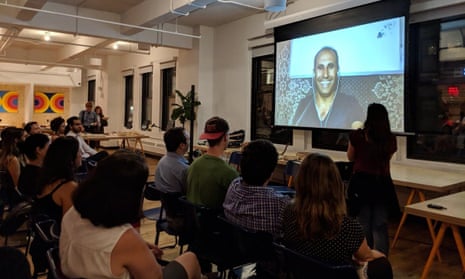Louisa Waugh and Ghaith Alhallak have met for language lessons in seven countries. “We counted it up the other day,” says Waugh, recalling the list of places from which she has video-called Alhallak: Britain, Mali, Senegal and Greece. Alhallak has answered from Lebanon, France and Italy, where he is now studying for a master’s degree in political science at the University of Padua.
“You just need a connection,” he says.
Alhallak teaches Arabic for NaTakallam, a language service that offers people the chance to learn Arabic, Spanish, Persian and French. What is unique is that all languages are taught by refugees.
The 770 students and 64 teachers at NaTakallam - “we speak” in Arabic – conduct their lessons entirely online, allowing refugees to speak to students who might not otherwise have contact with displaced people. The service also circumvents restrictions on work for refugees and asylum seekers in their new countries of residence, which means they can earn money.
“I really see it as solving two problems,” says one of NaTakallam’s founders, Aline Sara. “Refugees need access to an income, but with no work permit they’re often stuck in limbo. Yet they have innate talents within them in the form of their language, their story and culture, while so many people want flexible language practice,” she says. “There’s an idea that people always want to train and help refugees, but really they can help us.”
What began with Arabic gradually expanded to languages spoken by other refugee communities. NaTakallam’s team of teachers includes displaced Spanish-speakers from Venezuela and Central America, and French speakers from Burundi, Ivory Coast and the Democratic Republic of the Congo. “The best is when we have big tutor meetings on Zoom, with the Venezuelans telling Syrians they’ll teach them Spanish,” says Sara.
Teachers are routinely invited to speak to schools and universities, to feed into history or modern politics classes, or discuss issues facing refugees, and NaTakallam’s teachers now work on New York University’s Arabic-language programme and offer translation services.
Sara, a Lebanese-American, founded NaTakallam to improve her own Arabic, while looking to support Syrians living in Lebanon, who now number almost 1 million and are increasingly the target of restrictive labour laws.
“We live now in this online world and people learn languages over Skype,” says Sara. “This is a way for Syrians to get an income that isn’t taking from anyone in Lebanon, as the freelance world is open to everyone.”
The social network is part of the appeal for students and teachers. “We have language partners who got resettled through students with links to organisations,” says Sara. “One student shipped a laptop to his tutor because his broke down. The friendship side of things is very powerful.”
NaTakallam’s business model is well-suited to the coronavirus lockdowns and according to NaTakallam, enrolment increased 106% in March and 185% in April compared with February this year. Alhallak says former students have returned.
“One of our Venezuelan tutors told me she’s all alone in confinement, and that her NaTakallam students are the only people she talks to and connects with,” says Sara. So this makes the classes precious from the human exchange side, not just income.”
For Alhallak, it has been a lifeline.
Conscripted into the Syrian army shortly before the 2011 uprising, he fled the country in 2013 while on leave with a shrapnel injury. In Lebanon he was arrested.

“The Lebanese authorities gave me one week to leave Lebanon,” he says. “I had no place to go. I couldn’t go to the Syrian border to re-enter, as I’d be put to death. I would be considered a traitor.”
Forced to live illegally, Alhallak heard about NaTakallam. Teaching online was “exactly what I needed as I had no documents or residency papers”, he says. “It was better to work at home than walking in the streets.”
In 2016 a friend connected him with a charity resettling Syrians in Italy, which arranged his move to Padova. “He learned Italian in about five minutes,” jokes Waugh. Through their classes, Alhallak and Waugh, who briefly met in Beirut before he left for Italy, have become friends.
“It doesn’t feel like a lesson, it feels like a conversation, one that’s gone on for four years and taken in different countries and different times in our lives,” she says.
